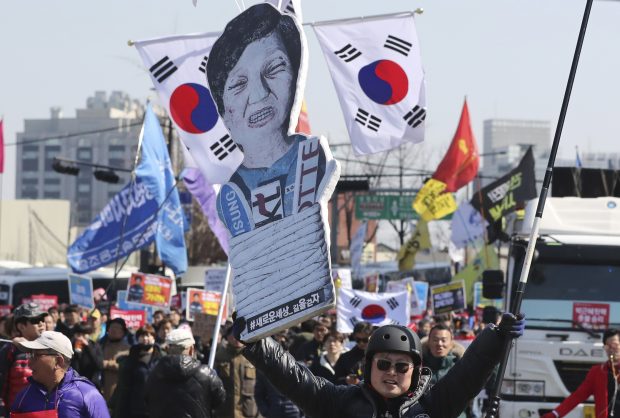Criticising the citizen Park Geun-hye

A protester carries a cutout of impeached President Park Geun-hye as they march toward the presidential house in Seoul, South Korea, Friday, March 10, 2017. In a historic ruling Friday, South Korea’s Constitutional Court formally removed impeached President Park Geun-hye from office over a corruption scandal that has plunged the country into political turmoil, worsened an already-serious national divide and led to calls for sweeping reforms. (AP Photo/Lee Jin-man)
Today marks the first day former President Park will spend in her private residence as an ordinary citizen. After being criticized for staying in the Blue House two additional days since her impeachment, Park was driven to her home in Samseong-dong (Gangnam) late Sunday evening.
Upon arriving at her residence, Park waved to longtime supporters holding the national flag to greet her. And quite unlike what many expected, Park Geun-hye appeared no different than usual—almost cheerful—as she shook hands with pro-Park officials. It was a scene that perplexed both the Korean society and the international community.
Having not made a formal speech accepting the Constitutional Court’s ruling, Park’s words to her loyal supporters coming out of the car, “It may take time, but the truth will eventually be revealed” were interpreted as a rejection to the final verdict. Some speculate that Park was alluding that her lawyers would file a suit against the court ruling.
In the meantime, the former President awaits criminal prosecution for charges of influence-peddling and the people of South Korea embark on a premature presidential race. Campaigning has changed to full-speed mode moving toward the election that will be held in just under two months.
As I (Eui-mi Seo), Alessandra Bonanomi, and Amiira Ismail assessed the current situation, we wondered if it was a good thing that so much participation in the national protests was going to result in larger-than-ever voter turnout for the spring election.
Quite tragically, the presidential scandal had brought even third-year high-school students preparing for the difficult college entrance exams out onto the streets of Guanghwamun Square. This in consideration, the following months may bring about great political enthusiasm.
Alessandra, being Italian by nationality, was surprised at how peaceful the demonstrations had been since late last year and noted that a healthier (South-Korean-like) protest-culture should take root in Italy. “It’s interesting that everyone gathered on Saturdays so that the nation would not come to a halt with everyone taking days off work.”
Significantly so, the President of South Korea was ousted. Yet, this is only the beginning for the nation. In the weeks to come, a new leader will take the seat and the question of corruption remains in the air.
Seo Eui-mi, Reporter for The AsiaN





















































